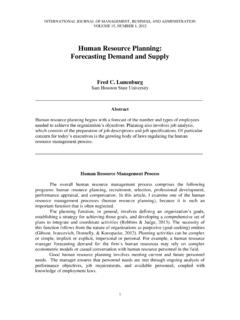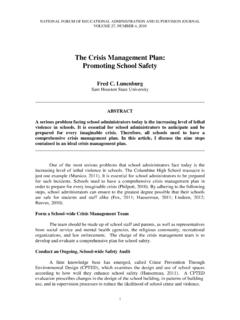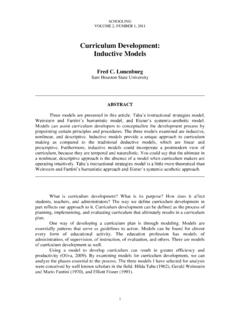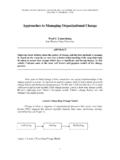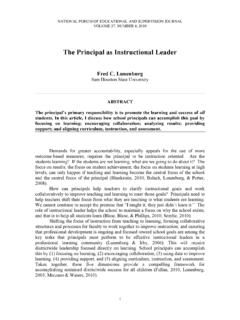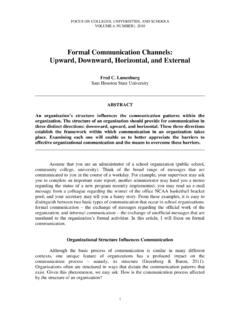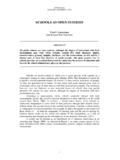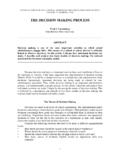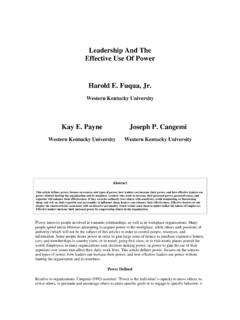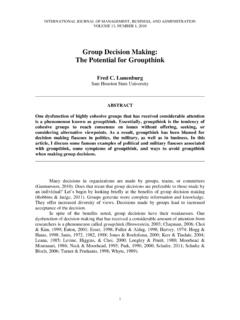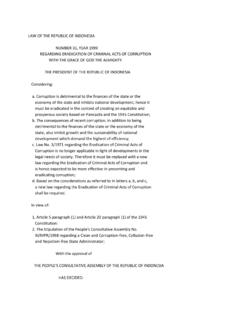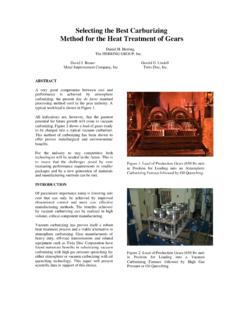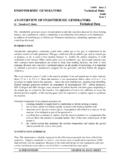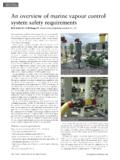Transcription of Motivating by Enriching Jobs to Make Them More …
1 INTERNATIONAL JOURNAL OF MANAGEMENT, BUSINESS, AND ADMINISTRATION VOLUME 15, NUMBER 1, 2011 1 Motivating by Enriching Jobs to Make Them More Interesting and Challenging Fred C. Lunenburg Sam Houston State University ABSTRACT Job enrichment is a job-design strategy for enhancing job content by building into it more Motivating potential. Expanding on the work of Frederick Herzberg, Richard Hackman and Greg Oldham provide an explicit framework for Enriching jobs. Based on their own work and the work of others, they developed a job characteristics model. In particular, the model specifies that Enriching certain elements of jobs alters people s psychological states in a manner that enhances their work effectiveness. Job enrichment is directed at improving the essential nature of the work performed.
2 The idea behind job enrichment is that motivation can be enhanced by making the job so interesting and the worker so responsible that he or she is motivated simply by performing the job. Specifically, job enrichment gives employees tasks requiring higher levels of skill and responsibility and greater control over how to perform their jobs. Job enrichment has its roots in Frederick Herzberg s (2009) two-factor theory of motivation. The Job Characteristics Model How can jobs be enriched? What elements of a job need to be enriched for it to produce desired outcomes? J. Richard Hackman and Greg Oldham (1980) developed a job characteristics approach to job enrichment. The model is based on the assumption that jobs can be designed not only to help workers get enjoyment from their jobs but also to help workers feel that they are doing meaningful and valuable work.
3 Specifically, the model identifies five core job characteristics that help create three critical psychological states, leading, in turn, to several personal and work outcomes (see Figure 1). INTERNATIONAL JOURNAL OF MANAGEMENT, BUSINESS, AND ADMINISTRATION 2_____ Figure 1. Job enrichment model. Components of the Model The five core job characteristics are skill variety, task identity, task significance, autonomy, and job feedback. Let s examine each one of these more closely. Skill variety. Skill variety is the degree to which a job requires a variety of different activities and involves the use of a number of different skills and talents of the employee. Jobs that are high in skill variety are seen by employees as: more challenging because of the range of skills involved; relieve monotony that results from repetitive activity; and gives employees a greater sense of competence.
4 For example, an administrative assistant with high skill variety may have to perform many different tasks ( , schedule meetings, make airline and hotel reservations, do research, prepare written reports, and meet with customers). Task identity. Task identity is the degree to which a job requires completion of a whole and identifiable piece of work that is, doing a job from beginning to end with a visible outcome. When employees work on a small part of the whole, they are unable to Core Job Characteristics Critical Psychological States Personal and Work Outcomes High internal work motivation High growth satisfaction High general job satisfaction High work effectiveness Experienced meaningfulness of the work Experienced responsibility for outcomes of the work Knowledge of the actual results of the work activities Skill variety Task identity Task significance Autonomy Job feedback Moderators Knowledge and skill Growth-need strength Context satisfaction FRED C.
5 LUNENBURG _____3 identify any finished product with their efforts. They cannot feel any sense of completion or responsibility for the whole product. However, when tasks are broadened to produce a whole product or an identifiable part of it, then task identity has been established. For example, dress designers will have high task identity if they do everything related to making the whole dress ( , measuring the client, selecting the fabric, cutting and sewing the dress, and altering it to fit the customer). Task significance. Task significance is the degree to which the job has a substantial impact on the lives of other people, whether those people are in the immediate organization or in the external environment. For example, medical researchers working on a cure for a terminal disease most likely recognize the importance of their work to society.
6 Even more modest contributions to an organization can be recognized as being important to the extent that employees understand the role of their jobs to the overall mission of the company. The point is that employees should believe they are doing something important in their organization or society, or both. Autonomy. Autonomy is the degree to which the job provides substantial freedom, independence, and discretion to the individual in scheduling the work and in determining the procedures to be used in doing the work. It is considered fundamental in building a sense of responsibility in employees. Although most employees are willing to work within the broad constraints of an organization, employees want a certain degree of freedom. Autonomy has become very important to people in the workplace.
7 For example, a salesperson is considered to be highly autonomous by scheduling his or her own work day and deciding on the most effective approach to use for each customer without supervision. Job feedback. Job feedback is the degree to which carrying out the work activities required by the job provides the individual with direction and clear information about the effectiveness of his or her performance. Feedback can be positive or negative, but it is best when it is balanced appropriately. Feedback should occur frequently rather than be delayed until the annual evaluation meeting. The only way employees can make adjustments in their performance is to know how they are performing now, not later. Feedback can come directly from the job itself, or it can be provided verbally by management or other employees.
8 For example, salespersons receive information regularly about how many contacts they make per day or week and the monetary value of sales made. As shown in the model (Figure 1), these core job characteristics have important effects on various critical psychological states. For example, skill variety, task identity, INTERNATIONAL JOURNAL OF MANAGEMENT, BUSINESS, AND ADMINISTRATION 4_____ and task significance together contribute to a person s experienced meaningfulness of the work. Jobs that provide a great deal of autonomy are said to contribute to a person s experienced responsibility for outcomes of the work. When they have the freedom to decide what to do and how to do it, employees feel more responsible for the results. Finally, job feedback is said to give employees knowledge of the actual results of work activities.
9 When a job is designed to provide employees with information about the effects of their actions in the workplace, they are better able to develop an understanding of how well they have performed and such knowledge improves their effectiveness. The job characteristics model indicates that the three critical psychological states affect various personal and work outcomes namely, people s internal work motivation, growth satisfaction, general job satisfaction, and work effectiveness. The higher the experienced meaningfulness of work; experienced responsibility for outcomes of the work; and knowledge of the actual results of work activities, the more positive the personal and work outcomes will be. When employees perform jobs that incorporate high levels of the five core job characteristics, they should feel highly motivated, be highly satisfied with their jobs, and perform work effectively.
10 Measuring the Scope of Each Job Hackman and Oldham (1980) theorize that Enriching certain core job characteristics alters people s critical states in a manner that lead to several beneficial personal and work outcomes (see Figure 1). Hackman and Oldham (1976) claim that job motivation will be highest when the jobs performed rate high on the various core job characteristics. Accordingly, they recommend measuring the degree to which various job characteristics are present in each job. These job characteristics can then be changed systematically to enrich the job and increase its motivational potential. This assessment can be accomplished by using a questionnaire known as the Job Diagnostic Survey (JDS) (Hackman & Oldham, 1975). The JDS yields an index known as the Motivating potential score (MPS), which is the degree to which the job has the potential for Motivating people.
